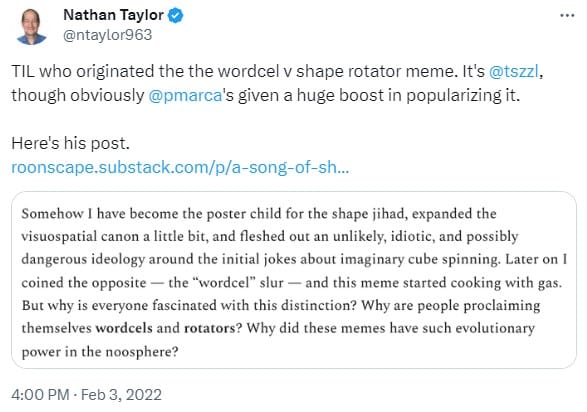The Long View 2009-02-27

John J. Reilly was an attorney, a writer, and very well-read. He did like to opine on science, although in my years of knowing him and my subsequent years of going through his writing, he never struck me as a man who approached the world in a primarily quantitative way.

John's approach was very textual, but I think it would be incorrect to apply the present day term "wordcel" to him, as that word often connotes someone who is under the impression what words construct reality. Rather, and possibly this is a matter of the time and manner of his education, John used words to try to approach the forms and concepts underlying whatever it was he was trying to analyze.
Thus, even though he never worked a problem with science in the way that I would have approached it, I respected his point of view and admired his conclusions.
A Surfeit of Incredulities
Surely I am not the first person to note that the Movement Conservative view of the Obama Administration is precisely symmetrical with that of the MoveOn.org Left view of the Bush Administration in at least one respect: both factions think that the incumbent administration is exaggerating a transitory problem into a catastrophe as a means to seize inordinate power. In Bush's case, the excuse was 911; in Obama's, the financial implosion. I make no comment here about the merits of these arguments. Just look at the similarity.
* * *
If you buy the Obama Party Line about the importance of the implosion, then you will no doubt find merit in Michael T. Klare's piece, A planet at the brink? The author ticks off the political instability and flashes of violence that have already appeared around the world because of the economic situation. Then he notes:
Some sense of this new reality appears to have percolated up to the highest reaches of the US intelligence community. In testimony before the Senate Select Committee on Intelligence on February 12th, Admiral Dennis C Blair, the new Director of National Intelligence, declared, "The primary near-term security concern of the United States is the global economic crisis and its geopolitical implications ... Statistical modeling shows that economic crises increase the risk of regime-threatening instability if they persist over a one to two year period" - certain to be the case in the present situation.
Curiously, he does not mention that President Obama is now receiving a daily financial briefing as well as a security briefing.
Here's a question: do the Tea Parties belong on the list of manifestations of this global phenomenon?
* * *
I try to be charitable, but I can't think of a single widely publicized neuroscience study that did not strike me as simple-minded or an outright scam. Now I learn that I have not been entirely alone in these suspicions:
Late last year, Ed Vul, a graduate student at MIT working with neuroscientist Nancy Kanwisher and UCSD psychologist Hal Pashler, prereleased "Voodoo Correlations in Social Neuroscience" on his website. The journal Perspectives in Psychological Science accepted the paper but will not formally publish it until May.
The paper argues that the way many social neuroimaging researchers are analyzing their data is so deeply flawed that it calls into question much of their methodology. Specifically, Vul and his coauthors claim that many, if not most, social neuroscientists commit a nonindependence error in their research in which the final measure (say, a correlation between behavior and brain activity in a certain region) is not independent of the selection criteria (how the researchers chose which brain region to study), thus allowing noise to inflate their correlation estimates. Further, the researchers found that the methods sections that were clearing peer review boards were woefully inadequate, often lacking basic information about how data was analyzed so that others could evaluate their methods.
This study caused something of a stir. It has been rebutted, and the rebuttals rebutted, and doubtless the surrebuttals rebutted. I have not studied the arguments in detail, but I suspect that neuroscience will be deflated too soon to become the Freudianism of the 21st century.
* * *
Speaking of audible unhappiness, John Tierney of the New York Times has baldly suggested that several eminent Obama appointees are putting Politics in the Guise of Pure Science:
Why, since President Obama promised to "restore science to its rightful place" in Washington, do some things feel not quite right?
First there was Steven Chu, the physicist and new energy secretary, warning The Los Angeles Times that climate change could make water so scarce by century's end that "there's no more agriculture in California" and no way to keep the state's cities going, either.
Then there was the hearing in the Senate to confirm another physicist, John Holdren, to be the president's science adviser. Dr. Holdren was asked about some of his gloomy neo-Malthusian warnings in the past, like his calculation in the 1980s that famines due to climate change could leave a billion people dead by 2020. Did he still believe that?
What particularly annoys the author is not that Obama's scientists are very worried about anthropogenic global warming, but that the only solution they will hear of is a cap-and-trade system to control carbon emissions.
Has a reporter ever interrupted one of Steven Chu's discourses on fairy-wheels and moonbeams to ask him about Polywell fusion?
* * *
Hat-tip to djold1 on the Bulletin Board for this piece commemorating the bicentenary of Darwin's birth. The authors suggests that one of my hobby horses may be the unfinished business of evolutionary biology. Among other things, it seems that Simon Conway Morris's notions of convergent and progressive evolution are now receiving a wider hearing. This is a break from the popular-science orthodoxy of the past thirty years, which had it that evolution was random, unpredictable, and irrelevant to any model of historical providence. The piece concludes:
In some ways, though, it does not matter whether humanity's evolution was entirely random or was predictable in its general form. For people do, now, have a united evolutionary common purpose: to halt that natural selection in its tracks. The species has evolved to the point where it understands itself, and can seek to escape the brutal handcuffs of nature and end the struggle for existence. The beginning of that understanding was provided by Darwin, and the application of Darwinism will be an important part of the process. That gives people every reason to celebrate his 200th birthday.
On Darwin be peace. However, whether evolution is viewed as convergent or random does make a difference to its audience. The progressive Left embraced evolution when it seemed to have agnostic implications, and therefore tended to obviate religious objections to cultural engineering. Conway-Morris's model would not serve that purpose. Note the irony: progressive evolution would tend to subvert progressive politics in the postmodern meaning of the latter term.




Comments ()